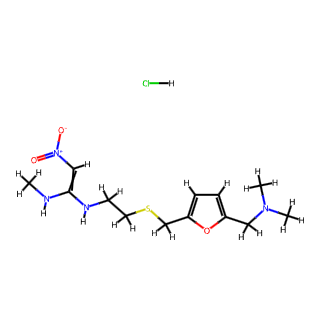- Synthetic anti-infective drugs
- Medications for the digestive system
- Antipyretic and analgesic drugs
- Medications for the blood system
- Medications for the respiratory system
- Anti-allergic drugs
- Medications for the urinary system
- Diagnostic medications
- Immunosuppressive and immunomodulatory drugs
- Vitamins and mineral supplements
- Antioxidants and medications for osteoporosis
- Antiparasitic drugs
- Ophthalmic medications
- Amino acids and their derivatives
- Dermatological medications
- Medications for the circulatory system
- Antitumor drugs
- Medications for the nervous system
- Hormonal and endocrine function-regulating drugs
- Antibiotics
- Others
CAS No.: 66357-59-3




Chemical Information:
English Name: Ranitidine Hydrochloride
Molecular Formula: C13H22N4O3S·HCl
Molecular Weight: 350.87 g/mol
CAS Number: 66357-59-3
Pharmacological Action:
1. Gastric Acid Reduction: Ranitidine Hydrochloride is an H2 receptor antagonist. It works by blocking the action of histamine on stomach cells, thereby reducing the production of stomach acid. This makes it useful in the treatment of conditions such as peptic ulcers, gastroesophageal reflux disease (GERD), and Zollinger-Ellison syndrome.
2. Ulcer Healing: By reducing stomach acid production, Ranitidine Hydrochloride promotes the healing of ulcers in the stomach and the first part of the small intestine (duodenum). It creates a less acidic environment, which facilitates the natural healing processes of the mucosal lining.
3. Prevention of Ulcer Recurrence: In addition to treating existing ulcers, Ranitidine can help in the prevention of future ulcers, especially in individuals who are at a higher risk due to factors such as long-term nonsteroidal anti-inflammatory drug (NSAID) usage.
4. Relief of Heartburn and Indigestion: The reduction of gastric acid can also relieve symptoms of heartburn and indigestion, providing symptomatic relief in conditions characterized by excessive stomach acid production.
5. Stress Ulcer Prophylaxis: In hospital settings, especially in intensive care units, Ranitidine is sometimes used to prevent stress ulcers which can occur in severely ill or post-operative patients.
6. Gastroesophageal Reflux Disease (GERD) Management: By decreasing the amount of acid in the stomach, Ranitidine Hydrochloride helps reduce the reflux of acid into the esophagus, thus managing and alleviating the symptoms of GERD, such as heartburn and esophageal inflammation.

Tai Yau Street, San Po Kong, Kowloon, Hong Kong, China.



